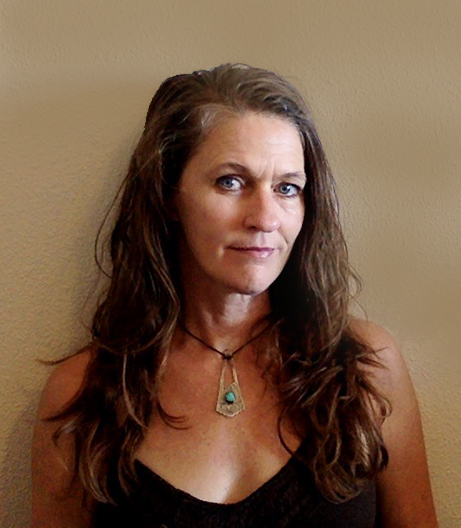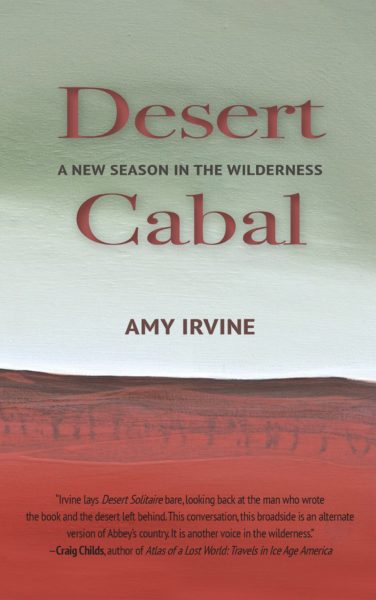
08 Nov Amy Irvine’s “Desert Cabal”: Final Reading at Ridgway’s Sherbino Theater, 11/11
Amy Irvine latest book, “Desert Cabal,” a keening from the depths of her dust-covered soul – in the best sense – is a series of essays which conjure the ghost of Edward Abbey as the world celebrates the 50th anniversary of his iconic “Desert Solitaire.” Irvine’s latest work, at once intimate and expansive, is a reminder that individuals, even titans like Abbey, can only do so much to save the “best places.” It really does take a village (or cabal): many humans, not just one.
Reading, book-signing and party began at The Livery in Norwood on Saturday, October 27, 6:30 p.m. $5 entry fee goes towards “Save the Livery” effort. (Read more about that here.)
On Wednesday, November 7, 6 p.m., we attended the event at Telluride Arts HQ for more of the same, this time in partnership with the Telluride Library and Between the Covers bookstore.
On Sunday, November 11, reading, signing and discussion takes place at Ridgways’ Sherbino Theater, 604 Clinton Street (in partnership with Cimarron Coffee & Books).

Space tourism seems to be about when rather than why. Companies like Blue Origin and Virgin Galactic have announced their goal to launch tourists into suborbital space within the next year and SpaceX recently revealed its plans to send up to eight artists on a trip around the moon.
And yet despite all of our technological advances leading to out-of-this-world explorations, the American West has not lost its allure – despite daily threats from the Beltway.
The West remains among the strangest and most mysterious spots on the continent – a big reason why Edward Abbey’s lyrical meditation on the expansive, dry scenery famously titled “Desert Solitaire” tops lists of books about the greatest adventures ever, alongside “Heart of Darkness by Joseph Conrad and “Into Thin Air” by Jon Krakauer.
Because of his move to the middle of nowhere Utah, critics describe Abbey as a 20th-century Thoreau. How will they describe Amy Irvine, whose recently published call-to-action, a remix of “Desert Solitaire,” is titled “Desert Cabal”?
In “Desert Cabal: A New Season in the Wilderness,” Irvine admires the man who influenced her life and work while, at the same time, challenging all that is dated – offensive, even – between the covers of Abbey’s environmental classic.
Irvine names and questions the “lone male” narrative—white and privileged as it is – that still has its boots planted firmly at the center of today’s wilderness movement – even as she celebrates the lens through which the rabble rousing Abbey taught so many to love the wild remains of the nation. From Abbey’s quiet notion of solitude to Irvine’s roaring cabal, the desert just got hotter, and its defenders more nuanced and numerous.
“This stream of consciousness, this conversation, this broadside is an alternate version of Abbey’s country. It is another voice in the wilderness,” says Craig Childs, author of “Atlas of a Lost World.” “Amy Irvine is Ed Abbey’s underworld, her roots reaching into the dark, hidden water. In a powerful, dreamlike series of essays, she lays ‘Desert Solitaire’ bare, looking back at the man who wrote the book and the desert left behind.”
“”Desert Cabal’ is a grief-stricken, heart-hopeful, soul song to the American Desert, a wail, a keening, a rant, a scolding, a tumult, a prayer, an aria, and a call to action. Amy Irvine implores us to trade in our solitude for solidarity, to recognize ourselves in each other and in the places we love, so that we might come together to save them. In this time of all out war being waged on America’s Public Lands, I’m glad she’s on my side.” writes Pam Houston, author, “Contents May Have Shifted.”
“If there wasn’t a woman in Ed Abbey’s trailer in Arches back in the 1950s, there is one now. And she has a room and a voice of her own,” raves Ken Sanders of Ken Sanders Rare Books.
“Ed Abbey’s rise to sainthood has been a bit awkward: here is an earth hero who guzzles gas in search of his personal Eden, a champion of the underdog who snubs Mexicans and Natives, an anarchist rabble-rouser who utters not a peep about his perch atop the patriarchy. Finally someone—and it could be no better iconoclast than Amy Irvine—wrassles him off the pedestal back down to the red dirt where he belongs. Half riot and half tribute, this is a roadmap through a crisis that neither Abbey nor any of us imagined,” explains Mark Sundeen, author of “The Man Who Quit Money” and “The Unsettlers.”
In other words, Amy Irvine pays tribute – while also playing the game of King of Crete, knocking King Abbey and, by implication, his fraternity, off their pedestal to make room for the women, children and indigenous people. Those eco-crusaders are strangely absent fro Abbey’s (and other’s) narrative.
In the forward to “Desert Cabal,” a shout, not a whisper, former backcountry caterer and professional river chef Blake Spalding says this:
“…All my life, I have fought to preserve wilderness for the sake of wilderness, but my fight is no longer about that. We’re talking now about survival—ours and that of the plants and animals and habitats under siege by runaway human destruction. Saving our common home will only happen if we preserve large, intact ecosystems in which whole communities of species, including humans, can flourish. And only if every one of us cares, engages, and takes action.
“Today, as I celebrate Edward Abbey’s fifty years of inspiring people to speak and act on behalf of Utah’s redrock country, a passage of his runs through my mind like a daily mantra. These are the words I reflect on, the words that help me muster more love, more communal spirit, just when my heart wants to give way to anger:
This is a remote place indeed, far from the center of the world, far from all that’s going on. Or is it? Who says so? Wherever two humans are alive, together, and happy, there is the center of the world…”
To which Irvine adds in the chapter entitled “First Morning”:
“…Mr. Abbey, may have developed whole fleets—generations’ worth—of desert defenders, but now they’re out there en masse, bumping into one another on the very ground on which you taught them to go lightly and alone. They are as much the problem as they are the solution, and it’s hard to know how we don’t divvy that down the middle, into us and them, right and wrong.
Your headstone says, ‘No Comment,’ but I’m hoping to discuss what we do next…”
And so she does., inveighing against the obvious black hats: coal mining, drilling, ATVs, uranium tailing, graffiti – also us: vanilla tourists and eco-warriors alike, even the mostly white liberals who pledge allegiance to the Sierra Club and The Nature Conservancy. Whatever and whoever threatens the landscape simply to check off an item on a bucket list or make big bank, anyone – and here I am taking some poetic license from Irvine’s chapter entitled “Cowboys and Indians” – who “camps, cooks, poops, and pumps our bikes amid ancient grounds where the region’s Native Americans once buried their dead, gathered their wood, harvested their medicine, hunted their sustenance, and painted their prayers…”
If our nature is really anti-nature, or if that reality (at least for some deplorables) just reflects this awful moment in time, if our version of the world, does not change, if we don’t find effective ways to protect the “best places,” the parks, monuments and wildernesses, it could be good night moon too.
“…So I say to you, go solo, into the desert. Yes, do this and love every minute. But then come back. Come fall in with the cabale that has joined together, to save what we know and love. It will take multitudes to slow the avalanche of apathy. And it will take a lot of devotion…,” Irvine explains in the last chapter, of “Desert Cabal,””Bedrock and Paradox,” in which she closes her conversation with Abbey.
And opens a new one with each of us.
A few questions for Amy Irvine (posed by her publicist):
What events or people inspired you to write your book?
Earlier this year, Andy Nettell of Moab’s Back of Beyond Books had commissioned me to write a foreword to an early draft of Desert Solitaire to commemorate its fifty years in publication. The goal was to celebrate DS while at the same time addressing the outdated aspects. This was daunting. DS is sacred and canonical—the bible of many conservationists and outdoor lovers. I didn’t know where to begin. One day, I flipped open to the table of contents, and realized I had my own stories that could
fell under the titles of the collection’s essays. As a woman whose devotion to and defense of Utah’s public lands was shaped largely by Abbey’s writing, and as a sixth-generation Utahn who had grown
up in an oppressive construct of white male privilege—a construct I experienced again in my work
with conservation organizations—it was important that I speak to Abbey directly, and so I imagined
the conversation taking place graveside, at his secret resting place in the Sonoran desert. I sat down
to write and couldn’t stop; the whole thing came out like a freight train bursting forth from a mountain tunnel into the light of day. I realize now that I’d been unable to speak my own desert dialect, to tell my own stories about Abbey’s country—and that the challenge now was to claim it as my country.
How does landscape shape your characters or stories?
Landscape and the body are one and the same for me. The ways in which one is traumatized or exploited, so is the other. We are all projecting—pain, fear, rage, desire, apathy—onto the body of the Beloved. The question is, are we victim or perpetrator? Or are we both? And can we move beyond this paradigm entirely?
How has landscape shaped you?
I tend to lay things bare, take things down to their deepest level, to find what is true and what is necessary. To this end, I tend to live on or near red rock, and off-the-grid, in more remote areas. I used to mistake this as a need for solitude. Now I know it’s the opposite. I am seeking communion with that which both sustains and sharpens us as beings who are woven into a larger mandala of life. I am most alive when I am moving through weather and rough terrain, when I am looking for food, tinder, shade, water. This is the poetry of what I would call primalcy. The way we awake both our animal bodies and our divine consciousness. When these are in balance, the world rights itself.
About the author:

Amy Irvine, angry as hell and not taking it any more, penned “Desert Cabal” to rally the troops – and challenge the ghost of Edward Abbey.
Amy Irvine is a sixth-generation Utahn and long-time public lands activist. Her work has been published in Orion, Pacific Standard, High Desert Journal, Climbing, Triquarterly, and other publications. Her memoir, “Trespass: Living at the Edge of the Promised Land,” received the Orion Book Award, the Ellen Meloy Desert Writers Award, and Colorado Book Award. Her essay “Spectral Light,” was a finalist for the Pen Award in Journalism, and her recent essay, “Conflagrations: Motherhood, Madness and a Planet on Fire,” appeared among the 2017 “Best American Essays” list of notables.
Irvine teaches in the Mountainview Low-Residency MFA Program of Southern New Hampshire University, in the White Mountains of New England. She lives and writes off the grid in southwest Colorado, just spitting distance from her Utah homeland.


Sorry, the comment form is closed at this time.